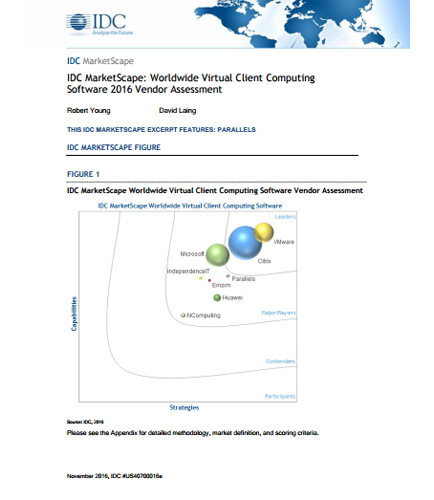
PROCESSING. PLEASE WAIT...


White Paper: Parallels
Virtual Client Computing technology plays a key role in the unified device management, which can enable an IT organization to focus more of its energy into strategic digital transformation (DX) endeavors as opposed to being consumed by managing PCs, users, applications, and devices.
In future, IT buyers looking into virtual client computing (VCC) software suppliers not only have to consider their company's current needs but also what they will need to accomplish DX.
This whitepaper provides insights to buyers entering the market or looking to refresh, update, scale up, or replace their current VCC deployment. It highlights:
Does the VCC solution integrate well with other IT/datacenter management tools?
Centralized virtual desktop-a form of server-based computing
Client virtualization model encompassing three other client virtualization technologies
Virtual User Session- for distribution to a nonnative environment
By: Parallels
Virtual Desktop Infrastructure (VDI) can help many large-scale businesses and organizations save money, simplify client image management, improve data security, and enable remote connectivity from any device. Considering the initial capital expense and overall complexity involved with implementing a traditional VDI solution, it’s no wonder that many cost-conscious customers, particularly small and medium businesses, have failed to adopt this traditional approach. In order to facilitate rapid and successful deployment of the Parallels Remote Application Server FlexCast models, the Parallels team has built and tested a solution using the components described in this white paper. Key takeaways from this white paper: Parallels Remote Application Server Virtual Desktop Types Parallels Remote Application Solution Overview Setting up the HVD solution based on the suggested scale-out increment Key decisions points and options offered by Parallels and Nutanix How Parallels Remote Application Server (RAS) reduce the cost and complexity of VDI
By: Parallels
This whitepaper depicts the upsides of utilizing thin clients instead of PCs, furthermore, shows how thin clients can deliver noteworthy cost savings over time to your enterprise. IGEL Technology and Parallels have been working together on thin client computing and virtual desktops since 2002 to deliver a solution for fast and economical implementation of server-based computing and desktop virtualization. This White Paper on “Thin Client” describes: What exactly are Thin Clients? Why Should You Switch to Thin Clients? IGEL Technology: Hardware and Software IGEL Technology: Advantages of Thin Clients IGEL Technology and Parallels Remote Application Server Advantages


 2026 All Rights Reserved | by: www.ciowhitepapersreview.com
2026 All Rights Reserved | by: www.ciowhitepapersreview.com